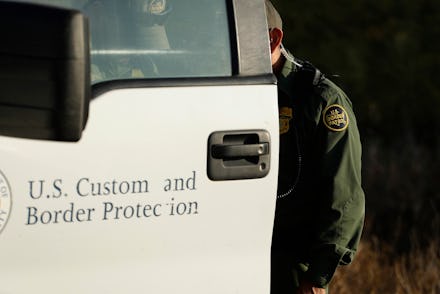The Trump administration will now take DNA from immigrants to send to the FBI

As part of the larger targeting of immigrants, the current administration now plans to gather more information on them than ever before. Starting this week, the Trump administration will collect the DNA of detained immigrants held by U.S. Customs and Border Protection (CBP) and Immigration and Customs Enforcement. It's an alarming move that advocates say signals a shift to utilizing DNA for the purpose of mass surveillance.
Original reports of the administration's plans to begin collecting genetic samples popped up in October. The Department of Homeland Security confirmed that the agencies were beginning their 90-day pilot programs in an impact assessment published publicly Monday.
The agencies must conduct pilot programs to do away with a past exemption from the DNA Fingerprint Act of 2005. This act gave the government permission to collect DNA from anyone who isn't a citizen and is detained by a federal agency. However, in 2010, then-Secretary of Homeland Security Janet Napolitano got an exemption that included detained migrants who weren't facing criminal charges or deportation proceedings.
At the time, Napolitano cited a lack of agency resources to collect DNA, CNN reported. That hasn't exactly changed now. The number of people detained by immigration officials continues to climb. According to ICE, over 41,000 people were in DHS custody at the end of 2019, and the number shot past 55,000 in the middle of the year. Neither ICE nor CBP have the capacity to collect DNA samples at such a large scale, so their pilot programs will target specific areas.
ICE plans to limit its pilot program to a single region, though the assessment failed to specify which one. However, CBP's starting point is clear: It will target those at the Eagle Pass Port of Entry in Texas and its sector in Detroit, Michigan, where a large portion of Arabs live.
In October, Vera Eidelman, a staff attorney for the ACLU's Speech, Privacy, and Technology Project, told The New York Times, “That kind of mass collection alters the purpose of DNA collection from one of criminal investigation basically to population surveillance, which is basically contrary to our basic notions of a free, trusting, autonomous society."
Under DHS's program, DNA samples will be mailed to the FBI and stored within its Combined DNA Index System (CODIS). According to the assessment, DNA samples will not be collected from anyone under the age of 14, although that still leaves minors from 15-17 vulnerable. People over 79 or who have physical or cognitive disabilities will also be exempt. CBP plans to eventually collect DNA from U.S. citizens and U.S. permanent residents in their custody.
The Trump administration has collected DNA from immigrants before. Over the summer, immigration officials used Rapid DNA testing to determine if people traveling together were actually family. The agency said the move was intended to cut down on "fraud" and child trafficking, but DHS doesn't have a great track record when it comes to looking out for kids.
However, these new pilot programs mark a clear escalation in the use of DNA. Those who attempt to enter the United States for whatever reason, including asylum, do not deserve to have their biometric information placed into federal databases — especially when they have no choice.